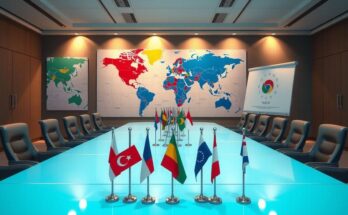Virginia’s electoral landscape is increasingly threatened by disinformation, particularly regarding noncitizen voting, as highlighted by the efforts of election officials like Eric Olsen. The 2025 elections loom with heightened concerns of misinformation, especially following Virginia’s recent voter purge initiatives led by Governor Youngkin. Advocates and officials anticipate a surge in disinformation during the upcoming election cycle, calling for informed responses and voter education initiatives.
In response to the rising threat of disinformation during elections, Eric Olsen, registrar of Prince William County since 2021, opened his office to educate the community on the electoral process. Having worked in election administration across multiple states for nearly 15 years, Olsen recognized the need to address concerns amplified by disinformation campaigns. Recent elections show how misinformation, particularly regarding noncitizen voting, has gained traction, necessitating proactive educational efforts.
The disinformation campaigns surrounding elections have escalated since the 2016 presidential race, exacerbating divisions within the electorate. As former President Trump leveraged false claims of widespread voter fraud in 2020, GOP leaders are now amplifying claims of noncitizen voting ahead of the 2024 elections. In Virginia, Governor Glenn Youngkin’s executive order to purge alleged noncitizens from voter rolls highlighted these troubling trends, fostering a growing narrative of election theft.
During April 2024, key Republican figures, including House Speaker Mike Johnson, emphasized concerns about noncitizen voting at a press conference with Trump. They claimed that even a small percentage of noncitizens participating in elections could lead to significant electoral impact. Consequently, Republicans introduced the SAVE Act, focusing on proof of citizenship and advocating for voter roll purges across states, which reverberated throughout Virginia’s political landscape.
Virginia’s own voter purge initiative, launched by Governor Youngkin, aimed to identify and remove alleged noncitizens. This program led to legal challenges when the Department of Justice and advocacy groups argued it violated federal laws, adversely affecting numerous citizens. Joan Porte, president of the Virginia League of Women Voters, noted that many individuals wrongly removed were naturalized citizens, prompting substantial advocacy and outreach efforts to restore voter registrations.
As Virginia gears up for the 2025 elections, voting rights advocates prepare for another round of disinformation campaigns fueled by lax campaign finance laws in the state. Both major candidates, Abigail Spanberger (D) and likely GOP nominee Winsome Earle-Sears (R), are amassing significant campaign funds, heightening concerns over the spread of misinformation. Advocates fear the influx of unmonitored contributions will lead to an intensified battle against disinformation embroiling elections.
Olsen remains vigilant in observing the potential evolution of disinformation tactics in upcoming elections. He reflects on previous cycles and recognizes the patterns of misinformation but also expresses hope that proactive measures may lead to a more informed electorate this year. Participation in discussions about the electoral process exemplifies an ongoing commitment to combating misinformation.
The pervasive nature of election disinformation is not unique to Virginia, as other states are similarly challenged. Advocacy groups are redirecting their resources to address the ever-evolving threats posed by misinformation in elections. Joan Porte affirms the need for robust counters against such misleading narratives, highlighting that vigilance and education will be paramount this November.
The article underscores the significant impact of disinformation on elections in Virginia and highlights proactive measures by election officials such as Eric Olsen to educate the public. As threats from misinformation grow, particularly surrounding noncitizen voting claims, advocacy groups are preparing for intensified battles ahead of the 2025 elections. The need for vigilance, education, and robust legal responses to misinformation is evident, emphasizing the importance of safeguarding electoral integrity.
Original Source: www.democracydocket.com




